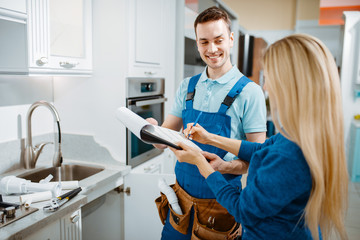
What Does a Residential Plumber Do?
Residential plumbers take care of plumbing tasks in houses and small apartment complexes. They typically have to be licensed and insured. If you have a leaky pipe in your home or bathroom, a residential plumber will help solve the issue. Plumbers Woodland Hills is also capable of unblocking drains and toilets.
 A residential plumbing system consists of the pipes, fixtures and appliances that deliver potable water to and from a house. It also includes the drainage systems that take waste away from a home to a sewer system or septic tank. Plumbers install, repair and maintain these plumbing systems. They also work with gas lines and may install and repair appliances like water heaters and dishwashers. Plumbers often begin their careers by working as an apprentice for a more experienced plumber and learn on the job.
A residential plumbing system consists of the pipes, fixtures and appliances that deliver potable water to and from a house. It also includes the drainage systems that take waste away from a home to a sewer system or septic tank. Plumbers install, repair and maintain these plumbing systems. They also work with gas lines and may install and repair appliances like water heaters and dishwashers. Plumbers often begin their careers by working as an apprentice for a more experienced plumber and learn on the job.
Some plumbers specialize in commercial or residential plumbing systems. Others focus on pipe systems only or work with specific appliances. When choosing a plumber for your home, look for one with a strong reputation in the community and amongst local homeowners. Ask friends, family and neighbors for recommendations and read online reviews. A plumber with a good track record is more likely to be professional, punctual and reliable.
Whether you choose to become a commercial or residential plumber, the first step is obtaining a plumbing license from your state. This is important because only licensed plumbers have the experience and knowledge necessary to correctly diagnose and repair problems. Additionally, state licensing requires plumbers to carry insurance that covers them for liability in case of an accident while working on a job site.
While the differences between commercial and residential plumbing are significant, there are some similarities. Both types of plumbing work with the same kinds of pipes, but a residential plumber is more likely to deal with issues that arise in homes. The main difference is that a residential plumber works directly with homeowners, while a commercial plumber is more likely to interact with business owners and managers.
While it may seem obvious that a residential plumber is more likely to handle smaller-scale plumbing issues, these two different kinds of plumbing work are very similar. Both are involved with piping systems, both are concerned with the delivery of water and the removal of waste, and both are focused on keeping homes safe and comfortable. Depending on your career goals, residential plumbing may be a more suitable option.
Residential plumbers repair and service the pipes, fixtures, and appliances that make up a home’s plumbing system. This can include everything from fixing leaky faucets to unclogging drain lines and toilets. Most often, these plumbers work with homeowners and landlords to handle small-scale plumbing issues that occur in their customers’ homes.
In some cases, however, a homeowner may need help with a larger-scale plumbing project. These jobs can involve rerouting water lines, installing new plumbing fixtures, and relocating gas pipes. In these instances, the plumber will likely need to consult with an architect or engineer to discuss the best way to get the job done.
While some plumbing problems are easier to fix than others, all plumbers face challenges when they deal with broken pipes and other complex systems. One challenge that residential plumbers often face is locating the source of the problem. This can be especially difficult in older homes with aging or worn pipes that can cause leaks without warning.
A skilled residential plumber can typically find the source of a leak or clog with relative ease, though. They can also offer advice on how to prevent future problems, such as by upgrading old or corroded pipes with more durable materials.
Residential plumbing services also include installing and repairing outdoor plumbing fixtures like garden hoses and sprinklers, as well as maintaining interior plumbing systems by cleaning drains, inspecting pipes for damage, and ensuring that all appliances are functioning properly. In addition, these plumbers can help a homeowner create a water conservation plan that will reduce their home’s water usage and save on energy costs.
When choosing a residential plumber, it’s important to choose one who is licensed and insured. This will ensure that the plumber has the proper training and knowledge to safely and effectively work on your plumbing system. In addition, a plumber who is insured will have workers’ compensation coverage in case they are injured while working on your property.
When looking for a residential plumber, it’s also smart to ask friends and family for recommendations. This will give you an idea of the average plumber’s experience and reputation in the community. Many plumbers also post customer reviews on their websites, which can be a great way to see what other people have experienced with them.
The plumbing system in any home or apartment eventually wears out and needs replacement. When this happens, it’s important to contact a licensed plumber with the right experience. Residential plumbers specialize in working with pipes that carry water and waste to and from appliances such as sinks, toilets, dishwashers, washing machines, and other household items.
In addition to replacing current pipes, these professionals are also skilled in piping new construction homes. This type of work requires interpreting blueprints and diagrams to properly assemble and install piping, fixtures, and drains. Residential plumbers also work on water systems, including installing and repairing water heaters.
Dealing with plumbing issues at a residential level is often more complex than at a commercial location. For example, if a homeowner complains of a leak or slow draining, a plumber may have to look behind walls and ceilings to determine the source of the problem. If the plumbing issue is caused by a large number of people using the same appliances, it can be more difficult to identify individual causes.
Another difference between commercial and residential plumbing is the clients that these plumbers interact with on a daily basis. Residential plumbers are more likely to work with homeowners, while commercial plumbers serve a mix of business owners, property managers, and tenants. This can make communication and scheduling more challenging.
One of the most common jobs for a residential plumber is to clear pesky clogged drains. This can involve using a snake to break up blockages in drains, toilets, showers, and kitchen sinks. It’s also possible that a plumber might need to dig up a yard in order to fix a broken pipe or sewer line.
For a more long-term solution, plumbers might recommend repiping a home’s existing plumbing. This can improve its overall efficiency and prevent future problems. Replacing old copper, galvanized steel, or PVC pipes with cross-linked polyethylene (PEX) tubing can help a home save money on utility bills in the long run. Generally, repiping costs more upfront than repairing a single drain or toilet, but it’s a great way to reduce water bills and avoid costly repairs in the future.
Residential plumbing services include inspections and maintenance to ensure the integrity of the entire system. This helps identify any potential issues before they become major problems that cause significant damage and disruption to your home life. Whether it’s clogged drains or water heater issues, plumbers are able to diagnose the problem and make any necessary repairs. In addition, regular maintenance can help save you money on energy bills by ensuring that all appliances are running efficiently.
Plumbing maintenance includes checking for leaks, clogs, and inconsistencies in water pressure. Leaks and clogs can be extremely dangerous, especially if left untreated, and can lead to serious health and safety issues. They can also cause damage to the rest of your home’s structure, resulting in costly repair bills.
Inconsistent water pressure is often caused by a problem with the water pump or a broken valve. It can be difficult to diagnose the issue without professional help, but a plumber can inspect and test all parts of the water piping to find the source of the problem. During maintenance, plumbers can also clean out drain aerators and shower heads to improve water flow and reduce blockages.
Another important service that falls under residential plumbing is the cleaning and inspection of water filtration systems. This is essential to ensure that your family is getting clean, healthy water that is free from any minerals, chemicals, or bacteria. This can be done as part of a routine maintenance visit, or during a more extensive water piping inspection.
The most important reason to get regular plumbing inspections is to prevent expensive repairs down the road. A faulty pipe can quickly turn into an emergency situation that requires major renovations to the whole house. Plumbing inspections are also a great way to increase your home’s value by identifying and fixing any potential problems.
Many people think that plumbing issues are easy to fix on their own, but this could not be further from the truth. Most of the time, these problems are much more complex than they look and require a professional to properly diagnose and resolve them. By taking the time to schedule regular plumbing maintenance, you can keep your home’s plumbing systems running smoothly all year round.
